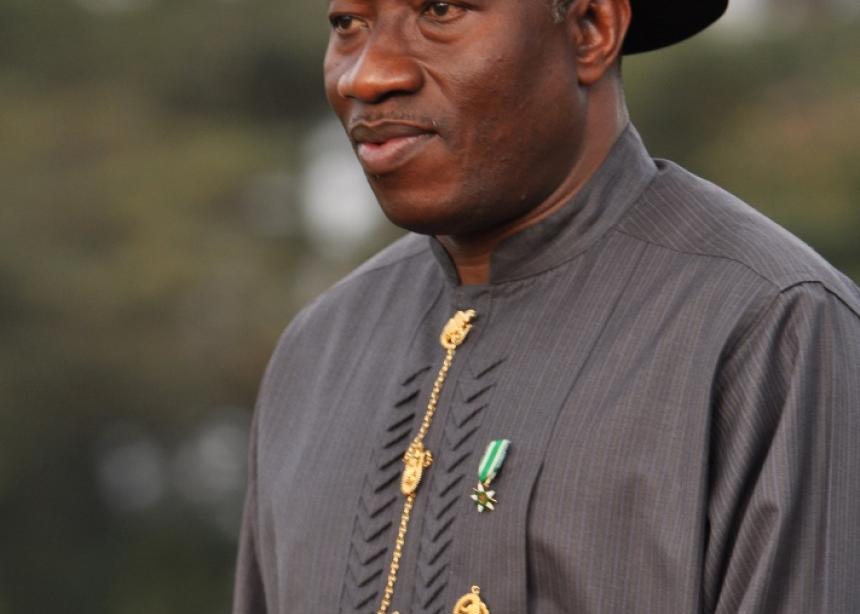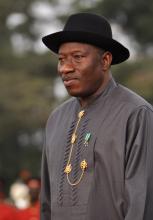For five years, bombs and bullets from Nigeria's Islamist group Boko Haram have ripped through churches and their members, raising concerns over the security of Christians in majority Muslim regions of the country.
But as similar attacks ignite violent reprisals by pro-Christian militias in the Central African Republic, Christian leaders in Nigeria continue to insist on a path of dialogue and nonviolence.
The clerics have also pressed President Goodluck Jonathan to use the state security services against the militants.
These Christian leaders want Jonathan to negotiate with Boko Haram leadership and end the campaign of terror.
Recently, militants have slaughtered both Christians and Muslims in the states of Borno, Adamawa and Yobe.
"We are living in perpetual fear and tension here in Maiduguri,'' said the Rev. John Bakeni, secretary of the Roman Catholic Diocese of Maiduguri in Borno.
On Friday (March 14), gunmen from Fulani, a largely Muslim ethnic community, attacked villages in Kaduna state in central Nigeria, killing more than 100 people.
The Fulani who migrate with their livestock have a long-standing land conflict with farming Christian communities, according to church leaders.
Humanitarian agencies say the attacks have forced hundreds of Christians to flee to the south and neighboring Cameroon, Chad and Niger. Human Rights Watch says more than 300,000 people have been forced out of their homes since 2009.
Boko Haram means “Western education is sinful” in the Hausa ethnic language. It is also known as “Jama'at Ahl as-Sunnah lid-da'aw wal-Jihad” in Arabic, or “Congregation of the People of Proselytism and Jihad.”
A young firebrand Muslim cleric known as Mohammed Yusuf founded the group in Borno around 2002. It gained prominence in 2009, when Yusuf issued a video to Jonathan calling for revenge after 17 of the group's fighters were killed in a clash with police. Yusuf died the same year, while under police custody.
Since then, attacks by Boko Haram have escalated.
Driven by the view that non-Muslims are infidels, the militants have attacked churches, government security installations and other institutions. By 2013, more than 10,000 civilians had been killed.
“Nigerians are dying like chickens,” said the Rev. Evaristus Bassey, national director of Caritas Nigeria, in a statement last week.
More than 400 churches have been attacked and destroyed since the launch of the group, according to the Northern Christian Elders Forum, which advocates for peace in Nigeria. About 20 of those churches are Roman Catholic, said Archbishop Oliver Dashe Doeme of Maiduguri. The extremists view Christianity as synonymous with Western education and the Western way of life, said Bakeni.
Recently, analysts started questioning the group's commitment to its earlier stated aim of complete and immediate implementation of Shariah, or Islamic law, in the whole of Nigeria.
“I think they are hiding under religion to gain sympathy and acceptance for their actions,” Bakeni said. “Shariah is no longer the bone of contention. What we are witnessing now is wanton massacre and murder of innocent people, Christians and Muslims alike.”
The group also wants the release of all arrested members from prisons across the country. “When a brother can stand up and kill a brother, this is not religion,” Archbishop Nemuel Babba, the leader of the Lutheran Church of Christ in Nigeria, told the Lutheran World Information Service in an interview.
“As faith leaders, we will continue to appeal to these groups to come and dialogue about what they want instead of using arms. We will preach and advocate peace, as violence only leads to destruction.”
Babba urged the global church community to demand that governments and the international community intervene to stop the killings. “We want to hear the Christian voice encouraging us, supporting us and pleading on our behalf,” he said.
—Posted March 20, 2014



Add new comment
Canadian Mennonite invites comments and encourages constructive discussion about our content. Actual full names (first and last) are required. Comments are moderated and may be edited. They will not appear online until approved and will be posted during business hours. Some comments may be reproduced in print.